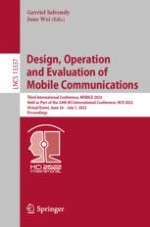2022 | OriginalPaper | Buchkapitel
How Arousing Benefits and Ethical Misgivings Affect AI-Based Dating App Adoption: The Roles of Perceived Autonomy and Perceived Risks
verfasst von : Zhuang Ma, Woon Kian Chong, Linpei Song
Erschienen in: Design, Operation and Evaluation of Mobile Communications
Aktivieren Sie unsere intelligente Suche, um passende Fachinhalte oder Patente zu finden.
Wählen Sie Textabschnitte aus um mit Künstlicher Intelligenz passenden Patente zu finden. powered by
Markieren Sie Textabschnitte, um KI-gestützt weitere passende Inhalte zu finden. powered by
